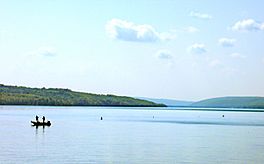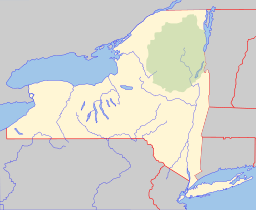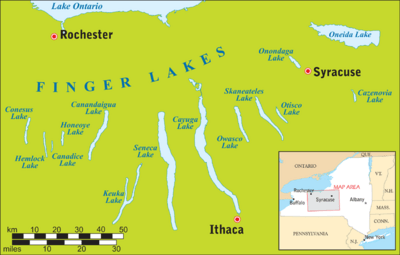Owasco Lake facts for kids
Quick facts for kids Owasco Lake |
|
|---|---|

Owasco Lake, looking south.
|
|
| Location | Cayuga County, New York, United States |
| Group | Finger Lakes |
| Coordinates | 42°48′54″N 76°30′30″W / 42.81500°N 76.50833°W |
| Type | Ground moraine |
| Primary inflows | Owasco Inlet |
| Primary outflows | Owasco Outlet |
| Catchment area | 208 sq mi (540 km2) |
| Basin countries | United States |
| Max. length | 11 mi (18 km) |
| Max. width | 1.3 mi (2.1 km) |
| Surface area | 6,784 acres (2,745 ha) |
| Average depth | 96 ft (29 m) |
| Max. depth | 177 ft (54 m) |
| Water volume | .193 cu mi (0.80 km3) |
| Shore length1 | 24.7 miles (39.8 km) |
| Surface elevation | 712 ft (217 m) |
| Islands | 2 (Off of Burtis Point and Deauville Island) |
| Settlements | Auburn, New York, Cascade, New York |
| 1 Shore length is not a well-defined measure. | |
Owasco Lake is the sixth largest and third easternmost of the Finger Lakes of New York in the United States. It is part of the traditional territory of the Cayuga nation.
Contents
History
Owasco Lake's name may have been derived from the Iroquois word dwas-co, meaning bridge on the water. The name may also have been derived from the word was-co, meaning floating bridge. Cayuga territory was found between the territory of the Onondaga and Seneca. Jesuits founded missions among the Cayuga in the mid-17th century. In 1660, there were approximately 1,500 Cayuga.
In the nineteenth century, Owasco Lake was a popular vacation spot for the well-to-do. A casino located just north of Cascade hosted guests traveling by rail along the western length of the lake. Vestiges of the railway remain in the swampy waters, but the casino burned down in the early years of the twentieth century. The "indianist" composer Arthur Farwell camped on the east shore in 1899, before assuming his teaching duties at Cornell University, and wrote a set of piano pieces depicting his experience, entitled "Owasco Memories." He included a representation of "The Casino Across the Lake."
Description
Owasco Lake is 11.1 miles (17.9 km) long, with a maximum width of 1.3 miles (2.1 km). The lake reaches a maximum depth of 177 feet (54 m) and has a surface elevation of 712 feet (217 m) above sea level, controlled by a dam on the lake's outlet. The lake has a volume of 212 billion US gallons (800,000,000 m3), and drains a watershed of 208 square miles (540 km2).
The city of Auburn is located at the northern end and takes its drinking water from the lake. The lake lies entirely within the boundaries of Cayuga County. Located at the south end of the lake is the hamlet of Cascade, which consists of a community of cottages, a marina, and a restaurant.
Owasco has a relatively large catchment area, compared to its overall volume. Unlike many of the other Finger Lakes, it is almost completely surrounded by agricultural land so the lake is especially vulnerable to high levels of nitrogen from farm run-off. It is also downstream from the villages of Moravia and Groton. This has created a marked increase in milfoil and other lake weed growth and affected oxygen levels in the lake. Sewage treatment effluent from two communities flows into the lake, which is not monitored with such stringent controls as neighboring Skaneateles Lake, which has the purest water of all the Finger Lakes.
Recreation
Owasco Lake is an excellent recreation spot. Because it is smaller and shallower than many other Finger Lakes, its waters warm up much more quickly, so swimming, water-skiing, and boating are popular. At the lake's northern end is Emerson Park, a county park featuring a beach and boat launch. The lake's northeastern corner is home to the private Owasco Yacht Club, founded in 1889.
Fishing
Fish species present in the lake include lake trout, brown trout, rainbow trout, landlocked salmon, largemouth bass, smallmouth bass, northern pike, yellow perch, bluegill, pumpkinseed sunfish, rock bass, black bullhead, pickerel, and walleye. There is access via county owned hard surface boat launch in the park on the north shore for a fee.
- Pritzker, Barry M. A Native American Encyclopedia: History, Culture, and Peoples, Oxford: Oxford University Press, 2000. ISBN: 978-0-19-513877-1.




